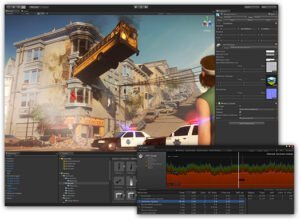Game development UK is a rapidly growing industry in the United Kingdom, with a rich history of creativity and innovation in game design.
Some of the world’s most successful game production studios are located in the UK., such as Rockstar North, Rare, and Codemasters. They have produced many beloved franchises like Grand Theft Auto, Tomb Raider, and Fable.
With an ever-expanding audience and a thriving indie scene, game development UK has become a diverse and exciting field that encompasses everything from AAA titles to mobile games to VR experiences.
In this blog post, we’ll take a closer look at what game development UK is and explore the key players, trends, and challenges shaping the industry.
Growth And Importance Of The Gaming Industry
The gaming industry has experienced remarkable growth and has become one of the most critical sectors in the entertainment industry. In recent years, the gaming industry has overtaken both the music and movie industries in terms of revenue, with the global market value projected to reach over $200 billion by 2023.
This growth can be attributed to many factors, including the increasing popularity of gaming worldwide, the rise of mobile gaming, and the introduction of new technologies such as virtual reality.
In addition to being a significant contributor to the economy, the gaming industry has become a vital part of popular culture, with many of the most successful game franchises having achieved widespread recognition and acclaim.
Games like Super Mario, The Legend of Zelda, and Grand Theft Auto have become cultural touchstones, influencing music, film, and television and serving as a source of inspiration for artists and creators across various media.
Moreover, the gaming industry has also created numerous job opportunities across various fields, from game development UK to marketing and sales. As the industry shall continue to grow, it will likely generate employment opportunities and foster innovation in technology and design.

Overall, the growth and importance of the gaming industry are undeniable, and this sector will continue to thrive in the years to come.
With the development of new technologies and the increasing popularity of gaming worldwide, the gaming industry is poised to become an even more crucial part of the global entertainment landscape in the future.
The Different Types of Game Development:
Here are some points outlining the different types of game development:
1. AAA game development.
This type of game development is usually undertaken in the UK. It involves creating high-budget, highly-polished games typically released on major gaming platforms like consoles and PCs.
2. Indie Game Development.
Indie game development refers to games created by independent developers or small teams not affiliated with major game publishers. These games often have lower budgets but can still be highly innovative and successful.
3.Mobile Game Development.
This type of game development UK involves creating games designed to be played on mobile devices such as smartphones and tablets. Mobile games have become increasingly popular in recent years due to the widespread use of smartphones and the ease of accessibility they offer.
4. Online Game Development.
Online games are played over the internet, typically with other players. This type of game development UK can include massively multiplayer online games (MMOs), browser-based games, and social media games.
5. Virtual Reality (Vr) Game Development.
VR game development UK involves creating games that can be played in virtual reality environments, often using specialized hardware such as VR headsets. This type of game development UK is becoming increasingly popular as VR technology becomes more advanced and accessible.
6.Serious Game Development.
Serious games are designed for purposes other than entertainment, such as education, training, or rehabilitation. This type of game development UK is often used in fields such as healthcare, military training, and education.
7. Educational Game Development.
Educational games are games that are specifically designed to teach specific skills or knowledge. This type of game development UK is often used in schools or for personal learning purposes.
8. Advergame Development.
Advergames are games that are explicitly created to promote a product or service. This type of game development UK is often used in marketing and advertising campaigns.
9. Gamification.
Gamification involves incorporating game mechanics and design elements into non-game contexts, such as education, fitness, or employee training. This type of game development is becoming increasingly popular in fields such as education, healthcare, and business.
The Tools and Technologies of Game Development.
The game development UK industry is constantly evolving, and new tools and technologies are continually emerging to help game developers create better games. Here are some of the most important used tools and technologies in game development UK.
Game Engines
Game engines are software frameworks that allow developers to create games more efficiently. Here are the most popular game engines used in the UK, including Unity, Unreal Engine, and CryEngine.
Programming languages
Game developers use a variety of programming languages to create games, including C++, C#, and Java.
3d Modeling Software
3D modeling software is used to create graphics and environments for games. Some of the UK’s most commonly used 3D modeling software includes Maya, 3ds Max, and Blender.

Audio software
Audio software is used to create sound effects and music for games. Popular audio software in the UK includes Ableton Live, Logic Pro X, and Pro Tools.
Virtual Reality (Vr) Technology:
Virtual RealityReality is an emerging technology that allows gamers to immerse themselves in a game world. Some popular VR technologies used in the UK include Oculus Rift, HTC Vive, and PlayStation VR.
Augmented Reality (Ar) Technology:
Augmented RealityReality is another emerging technology that overlays digital content in the real world. AR is used in game development to create unique and immersive gaming experiences. Popular AR technologies in the UK include Apple ARKit and Google ARCore.
Cloud Computing:
Cloud computing is used in game development to play games across multiple platforms and devices. Cloud-based game development services like Amazon GameLift and Microsoft Azure are becoming increasingly popular in the UK.
Game Testing And Debugging Software:
Game testing and debugging software is used to identify and fix bugs and errors in game code. Widespread game testing and debugging software in the UK include Unity Test Runner, Visual Studio, and Bugsnag. These are just a few of the various tools and technologies used in game development in the UK. As the industry evolves, new tools and technologies will emerge to help developers create even more impressive games.
Multiplayer Game Development
Multiplayer game development UK refers to creating games that can be played by multiple players simultaneously over a network, such as the internet. Multiplayer games have become increasingly popular, with games like Fortnite, Call of Duty, and League of Legends drawing millions of players worldwide.
Developing a multiplayer game requires a different set of skills and techniques compared to creating a single-player game. Here are some critical aspects of multiplayer game development.
1. Network Architecture.
One of the most critical aspects of multiplayer game development UK is designing the network architecture that will enable players to connect and interact with each other.
This involves developing server-side software, designing the game’s data exchange protocol, and implementing features like matchmaking, voice chat, and leaderboards.
2. Game Balancing.
Multiplayer games often require much balancing to ensure that all players have a fair and enjoyable experience. This includes balancing the gameplay mechanics, the weapons and equipment, and the different player classes and abilities.
3. Security And Anti-Cheat Measures.
Multiplayer games are vulnerable to various forms of cheating, such as aimbots, wallhacks, and exploits. Developers must implement robust security measures to prevent cheating and maintain the integrity of the game.
4. Scalability.
Multiplayer games can attract many players, so it’s essential to design the game’s architecture to be scalable and handle high traffic volumes without performance issues.
5. Cross-Platform Compatibility.
With players using different devices and platforms, ensuring that multiplayer games are cross-platform compatible is becoming increasingly important. This means designing the game seamlessly across different operating systems, devices, and platforms.
6. User Interface Design.
Multiplayer games require a user interface that can display real-time information, such as player positions, scores, and health. The user interface must be intuitive and easy to use to provide a smooth gaming experience.
In conclusion, multiplayer game development UK is a complex and challenging process that requires a wide range of skills and expertise. With the right tools and techniques, developers can create engaging and enjoyable multiplayer games that provide hours of fun for players worldwide.
Sound Design And Music In Game Development
Sound design and music play a significant role in game development UK and are critical to creating an immersive gaming experience. They help set the tone, create an atmosphere, and provide players with essential cues and information.
Sound effects and music can create a sense of tension, excitement, or relaxation, depending on the context, and can make players feel like they are part of the game world, enhancing the overall experience.
Several tools and techniques are used in sound design and music in game development UK. Digital Audio Workstations (DAWs) like Pro Tools, Logic Pro, and Ableton Live are essential tools for sound designers and composers.

These tools allow for audio file creation, editing, and mixing. Foley artists create sound effects using everyday objects like shoes, clothing, and props, which are then edited and mixed into the game. Adaptive audio is a technique that allows the music to change dynamically based on the player’s actions, such as becoming more intense during a boss battle or more relaxed during a quiet exploration sequence. Middleware like FMOD and Wwise integrates audio into the game engine, providing features like real-time mixing, 3D sound, and interactive music.
In conclusion, sound design and music are critical components of game development UK that enhance the overall player experience.
With the right tools and techniques, game developers can create immersive soundscapes that set the tone, provide important information to players, and create an emotional impact that adds to the game’s overall enjoyment.
Game Testing And Quality Assurance:
Game testing and quality assurance are essential components of game development UK that ensure a high-quality player experience. Bugs, glitches, and other issues can ruin the player experience and lead to negative reviews and lower sales, so it’s crucial to conduct thorough testing and quality assurance to avoid these issues.
Testing and quality assurance also protect the developer’s reputation, as a game with numerous issues can harm the developer’s reputation.
Several tools and techniques are used in game testing and quality assurance, including manual and automated testing. Manual testing involves a team of testers playing the game and looking for bugs, glitches, and other issues.
This type of testing is time-consuming but can uncover a wide range of topics. On the other hand, automated testing involves using software to run tests automatically and identify bugs and other issues. This type of testing is faster and more efficient than manual testing but may not catch all problems.
In addition to testing, quality assurance also involves verifying that the game meets specific quality standards. This can include testing for compatibility with various devices and operating systems, ensuring that the game is accessible to players with disabilities, and verifying that the game meets any legal and regulatory requirements.
Overall, game testing and quality assurance are critical to the success of a game. By conducting thorough testing and quality assurance, developers can ensure a high-quality player experience, protect their reputation, and save time and money in the long run.








